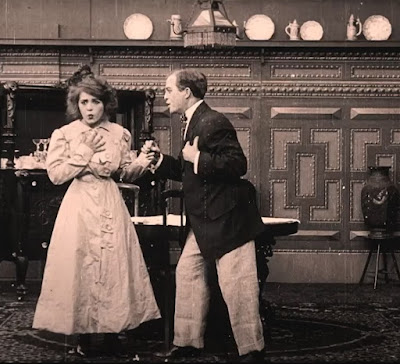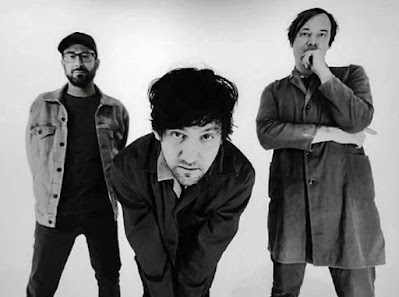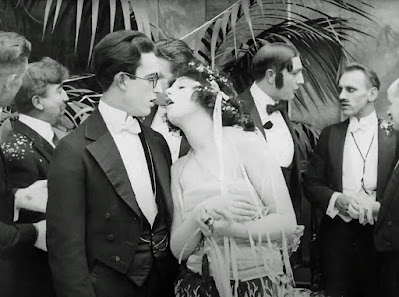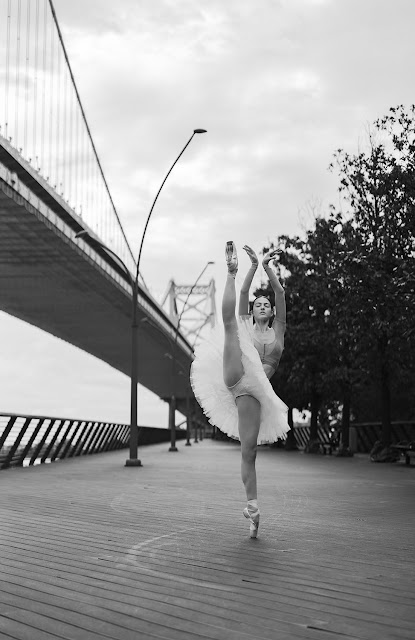It time for us to reveal another chapter in the secret life of
actress/adventuress Bessie Love. As is our habit, we translate the magical artifacts she encountered during this adventure in d20 System roleplaying game rules.
--
In October of 1928, Bessie Love traveled to Seattle, WA. She was her way to what was rumored to be the most haunted lighthouse in the world on Devastation Point, but the night her train pulled into the Seattle station, a series of brutal murders began. Someone was stabbing and mutilate young, beautiful, and free-spirited women... someone who seemed to simply dissolve into the rain or mist after performing the hideous deed. The killer eventually claimed eight victims and became known as the Seattle Creeper.
Love eventually tracked and defeated the killer, discovering that she was a librarian whose fiance had cheated on her with several women and then jilted her at the altar. The woman had a vast amount of arcane knowledge, which she used to acquire a trio of stealth-enhancing artifacts collectively known as the Mist Maiden's Kit, and then went on her murder spree.
After defeating the murderous woman, Love added the artifacts to her collection. She would, on occasion, use the Mist Maiden's Kit during her investigations since its potential drawbacks were minor and more inconvenient than dangerous.
 |
| Bessie Love wearing the Mist Maiden's Kit |
d20 SYSTEM RULES
The rest of the text in this post is released under the
Open Game License, and it may be produced in accordance with those terms.
The Mist Maiden's Kit
In 1924, a young couple, Carlton Jamieson and Lisa Svensen decided to become "rum-runners" and smuggle illegal liquor from Canada and across Lake Erie. The couple already ran an "underground railroad" that smuggled criminals and other people on the run across the Lake Erie from Cleveland and into Canada, so was a small thing for them to expand into a new and lucrative area.
Carlton and Lisa were both from families who were long-time practitioners of sorcery and they used their arcane knowledge to facilitate their smuggling ventures, be they transporting humans or booze. Lisa had crafted a number of items that augmented stealth while Carlton enchanted their boat to travel more quickly and quietly across the waters. Although young, Lisa was already renowned for her ability to transform or conceal items or beings, and had earned the nickname "The Mist Maiden." (It was a small irony that Lisa was an expert at stealth magic, since she loved being fashionable and loved being the center of attention.)
Sadly, the couple's magic was no protection when hardcore gangsters decided they wanted to take over their operation, and killed Carlton while sinking the boat. A heartbroken Lisa used her magical gifts to take revenge on those who murdered her beloved. She used the same magical tools that had once helped her avoid detection while smuggling to gain access to those who murdered Carlton and execute them.
When the last man involved with the murder was dead, Lisa wished that she could be reunited with Carlton, and she dissolved into mist, leaving behind only the stealth-augmenting artifacts she was wearing--the Galoshes of Stealth, the Raincoat of Protection, and the Rainhat of Hiding. Each of the three items have a magical effect when worn, but their individual magical auras combine to provide the wearer with the ability to dissolve herself and all things worn or carried into vapor and then later reversing the process.
The Galoshes of Stealth
This is a pair of tan rubber overshoes that can be fastened to protect the wearer's calves as well. (During the 1920s, it was fashionable for young women to leave their galoshes unfastened, with the tops either folded or flapping loose.)
The Galoshes of Stealth protects the wearer's feet (and lower legs, if properly fastened) from any liquid she might step in, up and including lava. Additionally, the wearer can move through any type of terrain and leave neither footprints nor scent. Tracking the subjects is impossible by nonmagical means.
The Raincoat of Protection
This is a black-trimmed, tan raincoat that's covered in a delicate, floral pattern that conceals the magical runes powering the item's enchantments. The pattern matches that on the Rainhat of Hiding.
The Raincoat of Protection grants the wearer a +2 to AC/DR, as well as a +4 bonus to saving throws made to resist effects and damage from element-based spells and abilities. Finally, once it is brought out of the rain, it is immediately dry and clean.
The Rainhat of Hiding
This is a black-trimmed, tan rainhat that's covered in a delicate floral pattern that conceals the magical runes powering the items enchantments. The pattern matches that on the Raincoat of Protection.
The Rainhat of Hiding grants the wearer a +4 bonus to all Hide skill checks and a +4 bonus to Move Silently checks. The bonuses are lost if the wearer intentionally calls attention to him- or herself, such as making an attack, a loud noise, or waving around a flashlight or bright object. The bonuses can be restored if the character can duck out of view of watchers.
Like the Raincoat of Protection, this item is immediately dry and clean once it is brought out of the rain.
Combined Powers of the Maiden's Kit
When worn together, the three items give the wearer the ability to turn into a cloud of fine mist that is roughly the same shape and size as the character when wearing the Maiden's Kit. In order to transform, the wearer must take a full round action to will herself to assume a misty form, and make a successful Willpower saving throw (DC8). If the check fails, another attempt can be made the following round.
Once transformed into mist, the character gains the following benefits:
* Gains +20 bonus to all Hide checks when outside in the dark, and a +10 bonus if inside in the dark. If someone were to Is completely undetectable through normal means when in mist or fog.
* Can do anything a cloud of mists can do, such as flow through a crack under the door or a window. The character leaves a very faint trail of moisture.
* Can move across the surface of water at the same movement rate as if on solid, even ground. (The character cannot enter the water, however.)
* Immune to physical attacks, but also cannot make attacks or cast any spells, defensive or offensive.
* +4 bonus to all saving throws against effects and damage from magical and supernatural attacks.
The transformation ends if the character loses consciousness, is subjected to an anti-magic field, dispel magic (at a 20th-level caster strength), or takes a full round action to will herself back into a solid state with a successful Willpower saving throw (DC12). If the Willpower roll fails, the character remains in her misty state for 1d12+2 hours before finally becoming solid again.
--
For a complete index to all of Bessie Love's adventures that have been revealed here at Shades of Gray,
click here.



















































.jpg)
